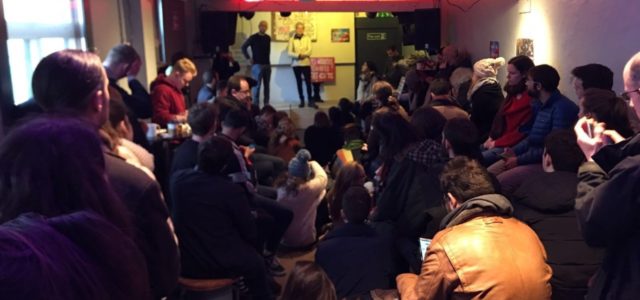Ioannis Costas Batlle and Aurelien Mondon
Even though pensions are at the heart of the current dispute, the strikes spreading across more than 60 British Universities are about much more. They are about the marketization of higher education; they are about a sector frustrated with ballooning salaries and perks for senior management, increased job casualisation, and soaring student fees. All of this has fuelled an environment where students are encouraged to act increasingly as consumers rather than learners, buying degrees as any other mass-produced commodity rather than making the most of a space which should be dedicated to critical learning and creativity.
The student-as-a-consumer approach narrows the spectrum of what education is. In the marketized university, ‘educating’ students is often limited to subjecting them to a system where marks are the only item of value, and transferable skills are limited to near mechanical itemisation fit only for the current labour market. As US stand-up comedian, the late George Carlin, put it, the current system produces “obedient workers who are just smart enough to run the machines and do the paperwork but just dumb enough to passively accept” the society they live in. In the marketized university, there is no space to promote true critical thinking, empathy, and empowerment. That is, until thousands of staff and students went on strike and said, “enough is enough”.
Once the strikes began, staff and students across the UK seized the opportunity to create a space for education beyond the confines of university walls. By seeking refuge in community centres, churches – or, in some cases, braving snow covered streets – the university community started to reclaim a broader understanding of education. These Teach Outs have emerged more or less spontaneously, and have taken different shapes depending on the staff and students of each university. Some feature longer lecture formats, whilst others, like at the University of Bath, are comprised by a mixture of short talks, discussions, and workshops.
What has been truly extraordinary about the Teach Out in Bath is that the space – either a pub, or a community centre, whichever is available – has blossomed into everything current universities are not, but should be. Organised by staff and students, a typical Teach Out runs for three hours in the afternoons (although conversations often spill into the evening), is programmed on an ad-hoc basis depending on volunteers and the interests of the community, and is advertised both via a Facebook page and, more importantly, word of mouth. Speakers (both staff and students) volunteer to deliver short (10-15 minute) talks which provide the basis for a general discussion afterwards. In addition to talks, students and staff have organised games (like the social strike game), or facilitated workshops around creating a Free University.
The Bath Teach Out represents a real, successful attempt at non-formal education. Free from the shackles of over-inflated hierarchies, assessments, and a narrow understanding of ‘education’, the Teach Out offers an egalitarian space shaped by everyone in it. The ‘curriculum’ emerges based on people’s needs and interests. While current issues such as the marketisation of universities or emancipatory education have taken centre stage so far, talks about where to take this space forward have led participants to explore bolder trajectories. Beyond the topics discussed, it is a space where meaningful relationships have flourished in the space of days; a setting where staff and students have come together and learned more about and from each other, and (re)discovered how to empathise with each other.
Our Teach Outs have re-vitalised staff and students by offering a powerful reminder that education is not just about passing exams and churning out employees for what is at present a depressing labour market. Emancipatory education, along the lines of Jacques Ranciere and Paolo Freire, is about encouraging individuals to take learning into their own hands and to shape their learning environment as agent rather than passive recipients. It is about sharing, challenging and exploring ideas in a creative and democratic setting which allows human beings to feel both vulnerable and empowered. It is about learning and thinking for its own sake.
Within its first three days, the Bath Teach Out established itself as a caring and welcoming space. In just half a week, the Teach Out resembled the environment many of us hope to generate in a university classroom over the course of weeks, yet rarely fully achieve due to the anxiety of looming assessments. The Teach Out is not about, as a colleague put it, transferring knowledge from one brain to another; it involves everyone in the room and encourages all to create knowledge and learn from each other about how to make sense of the world. This is a skill which should be key to any graduate entering a treacherous system, but is dramatically lacking today in our one-size-fits-all education luxury supermarkets.
Of course, striking is a last resort and has been painful to both staff and students. However, if it were not for the strikes, we would not have been encouraged into creating the Teach Out. In our minds, there is no doubt: we are grateful that this space has emerged, and both staff and students involved so far have shown incredible resolve for it to remain open and become sustainable, for themselves, but also the wider community. The Teach Out has provided a vivid reminder that emancipatory education is very much still alive, and it is worth fighting for.
Ioannis Costas Batlle and Aurelien Mondon are lecturers at the University of Bath and participants in the Bath Teach Outs.
